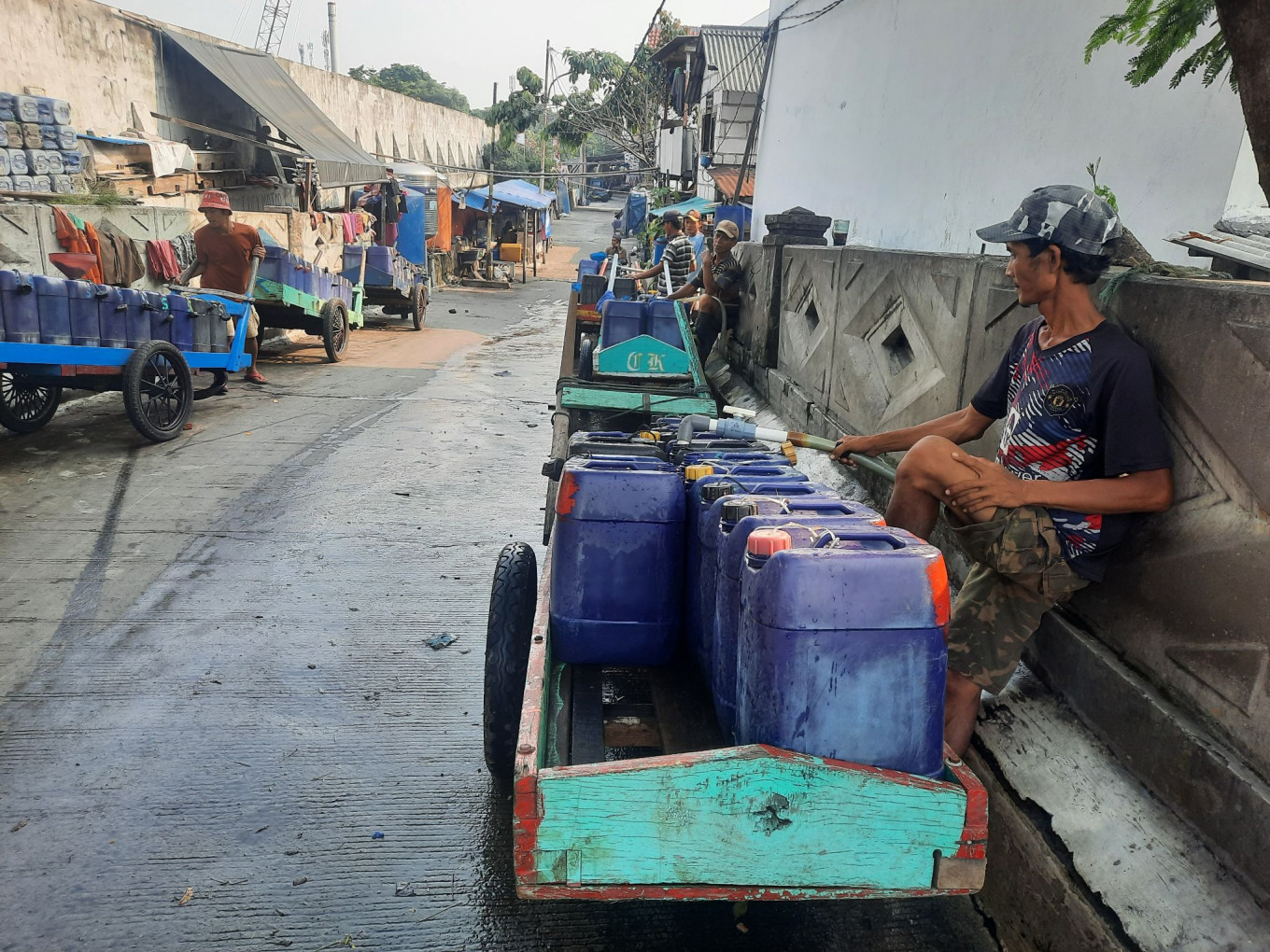Privatized water still muddying Jakarta: Civil society groups
Civil groups have raised their suspicion that PAM Jaya's latest "bundling" deal with Moya Indonesia is simply another way to keep private companies' hands in the city's water system.
Change text size
Gift Premium Articles
to Anyone

A. Muh. Ibnu Aqil
The Jakarta Post/Jakarta
A group of civil society organizations has expressed concern that privatized water was still lingering in Jakarta, instead of fully returning the utility’s management to city-owned PAM Jaya, which denies the allegation.
The utility company insists that it now has full control of the capital’s drinking water system.
For 25 years, PAM Jaya cooperated with two private water companies to provide piped water in Jakarta: Aetra in the city’s eastern area and Palyja in western area.
On Jan. 31, 2023, the utility company’s cooperation agreements with Aetra and Palyja ended and the private companies’ assets were handed over to PAM Jaya, which also rehired all of their employees.
By last year, the public tap water system in the city had reached 65 percent coverage, and PAM Jaya aims to provide 100 percent coverage by 2030.
In October 2022, however, months before the company’s agreements with Aetra and Palyja ended, the city utility company signed a bundled contract with PT Moya Indonesia, which was given management of six of the city’s 13 water treatment plants, with PAM Jaya to purchase and distribute the water they produced to its customers.
The Coalition of Jakarta Residents Opposing Water Privatization (KMMSAJ) has expressed concern that even though the cooperation agreements with Palyja and Aetra had ended, PAM Jaya’s new contract with PT Moya Indonesia was simply a “new chapter” in Jakarta’s water privatization saga. As such, the group demanded that the city utility company fully take over the drinking water system.
Aprillia Lisa from the Jakarta Legal Aid Foundation (LBH) said Jakarta residents had for years been fighting for more equitable access to piped water by encouraging the city to fully municipalize the water service.
“This is a new process in the water service, which is PAM Jaya’s new cooperation [with Moya Indonesia], but the aspirations of the people are not being heard,” Aprilia told an online discussion on Wednesday.
She added that Jakarta’s residents had long complained about subpar utility services due to water privatization, from high bills to limited water distribution.
“These are some of the most clear examples of the results when water access is not fair,” Aprilia said.
Meanwhile, researcher Dewi Anggraeni of Indonesia Corruption Watch (ICW) said that in addition to residents complaining of poor water services for years, PAM Jaya’s new cooperation with Moya Indonesia was also not transparent.
Dewi pointed out that PAM Jaya’s contract with Moya Indonesia was not created through the online procurement platform it ran for just this purpose. Meanwhile, Moya Indonesia still maintained ties with one of the city utility company’s previous private partners, Aetra.
The parent company of both Moya Indonesia and Aetra is Moya Holdings Asia Limited, an investment holding company headquartered in Singapore that did business with water treatment plants belonging to tycoon Anthoni Salim of conglomerate Salim Group.
Dewi also said that cooperating with private water companies posed a risk of fraud. She noted that the Corruption Eradication Commission and the Development Finance Comptroller had found in 2020 that the PAM Jaya-Aetra cooperation only benefited the latter, and not customers.
PAM Jaya has denied that its cooperation with Moya Indonesia was a new water privatization scheme. It stressed that the scheme was a “bundled” cooperation agreement, in which Moya Indonesia only operated some of the production process while PAM Jaya was wholly responsible for distribution and customer service.
“Bundling [sic] cooperation is not privatization, but a fiscal innovation that we have to take due to the fiscal limitations of PAM Jaya and the Jakarta administration, which also focused [its budget] on pandemic handling,” PAM Jaya said in a statement provided to The Jakarta Post on Friday.
The utility company also said the bundled contract was in line with a Constitutional Court ruling in 2013, which stated that the drinking water system must not be left to the private sector, as PAM Jaya still fully managed distribution and customer service.









